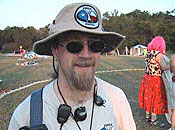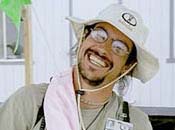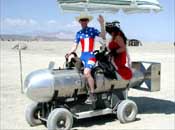Most of the Rangers you meet in Black Rock City are so-called “Dirt Rangers,” the khaki-wearing women and men who patrol the city streets on bicycle and on foot. The Rangers operations group is responsible for training and organizing these Rangers .
The year 2001 presented many challenges as the Rangers Operations and Training departments continued to mature. With a somewhat late start after the Ranger senior staff reorganization, we immediately went into high gear to put new functional structures, protocols, and technologies in place. Over the course of the year prior to Burning Man 2001 there were typically one or two Ranger senior staff meetings per month, as well as a variety of departmental meetings. In addition Ranger Operations and Training groups met at least twice monthly.
 The training department started from scratch in late 2000 to create a consistent and uniform preparation for all new and returning Rangers. Working from a model of experiential training, the curriculum incorporates games, interactive scenarios, and lectures. All Dirt Rangers completed this 8-hour training before their first shift on the playa. The success of this training created a solid base for expansion and refinement in 2002. The Austin training was particularly unique in that it was done onsite during a camping event organized by Austin-based Burning Man participants.
The training department started from scratch in late 2000 to create a consistent and uniform preparation for all new and returning Rangers. Working from a model of experiential training, the curriculum incorporates games, interactive scenarios, and lectures. All Dirt Rangers completed this 8-hour training before their first shift on the playa. The success of this training created a solid base for expansion and refinement in 2002. The Austin training was particularly unique in that it was done onsite during a camping event organized by Austin-based Burning Man participants.
Ranger training sessions were held nearly every weekend throughout May, June, and July. Because Rangers increasingly come from both near and far, training sessions were conducted in a variety of locations including Austin, Seattle, Point Reyes, Santa Cruz, San Francisco, and, of course, in the Black Rock Desert, once in July and once during the early days of the event.
Training continued on the playa with a newly reworked mentoring system. Mentors met several times in the six months prior to the event to devise a general structure and evaluation system. All Rangers participated in mentoring during their first few shifts. Not everyone who wants to be a Ranger is meant to be one. Ranger Mentors review information from the training and evaluate the on-patrol behavior of prospective Rangers during their first shift. Not all prospective Rangers are passed, however in every case, Black Rock Rangers are made, or broken, in the dust.
 Ranger Operations rocked the playa. The Ranger Operations structure expanded to provide a better level of coverage throughout the city. We added a multi-shift oversight position, the Officer of the Day, to ensure continuity of response by briefing shift leaders when they came on duty and tracking developing situations.
Ranger Operations rocked the playa. The Ranger Operations structure expanded to provide a better level of coverage throughout the city. We added a multi-shift oversight position, the Officer of the Day, to ensure continuity of response by briefing shift leaders when they came on duty and tracking developing situations.
Each shift was led by a team of three shift leaders, who shared the lead responsibilities, and increased citizens’ access to support at the Ranger Headquarters as well as support for Rangers on duty. One of the shift leaders’ tasks was a new radio dispatch role, called “Khaki”, which coordinated Dirt Rangers throughout the city and documented their activities to ensure continuity during shift changes.
Shift leaders participated in a year-round email discussion group, as well as some training sessions that included a sophisticated simulation of BRC. Ranger leaders also had special ops-designed notebooks to assist them in the challenging task of distributing patrolling Rangers throughout our city.
Shift changes and record keeping were facilitated for the first time this year with a barcode-enabled database system. Ranger Headquarters in Center Camp gained an Old West theme and a community fire barrel this year, as well as generous bike parking areas, shade structures, and a couple of outdoor meeting areas. We hope you took a ride on Ol’ Paint, our mechanical horse!
 The Department of Mutant Vehicles was given a fixed location and increased staff this year. Because this was a small, self-reinforcing community, the standards applied to art vehicles were more consistent than ever, and the DMV crew has already come forward with a variety of ideas to make their operation even better next year. We expect that Burning Man Senior Staff will continue to refine the definition of an art vehicle in an effort to maintain the safety of BRC streets for pedestrians and cyclists.
The Department of Mutant Vehicles was given a fixed location and increased staff this year. Because this was a small, self-reinforcing community, the standards applied to art vehicles were more consistent than ever, and the DMV crew has already come forward with a variety of ideas to make their operation even better next year. We expect that Burning Man Senior Staff will continue to refine the definition of an art vehicle in an effort to maintain the safety of BRC streets for pedestrians and cyclists.
Exodus came back for its second appearance, with some important refinements and lessons learned from its first run in 2000. There were some resource and communication problems that made participation in the Exodus crew a more heroic undertaking than should have been necessary, however the dedication of the crew resulted in a smooth departure for most of the participants of Burning Man. Reports from participants indicate that other than delays caused by the accident and closure of Highway 447 on Sunday night, the wait to leave the playa was never more than 2 hours. In most cases, departure from camp to blacktop averaged 45 minutes. Exodus will be back in 2002, better than ever, helping us all leave our desert home with as little trauma as possible.
2002 will present new opportunities for further refinement. We began preparations at the end of September. Special challenges include addressing problems with traffic in the city, improving Exodus coordination, and planning additional regional trainings to broaden the base of Ranger staff to include participants from every corner of our worldwide community.

